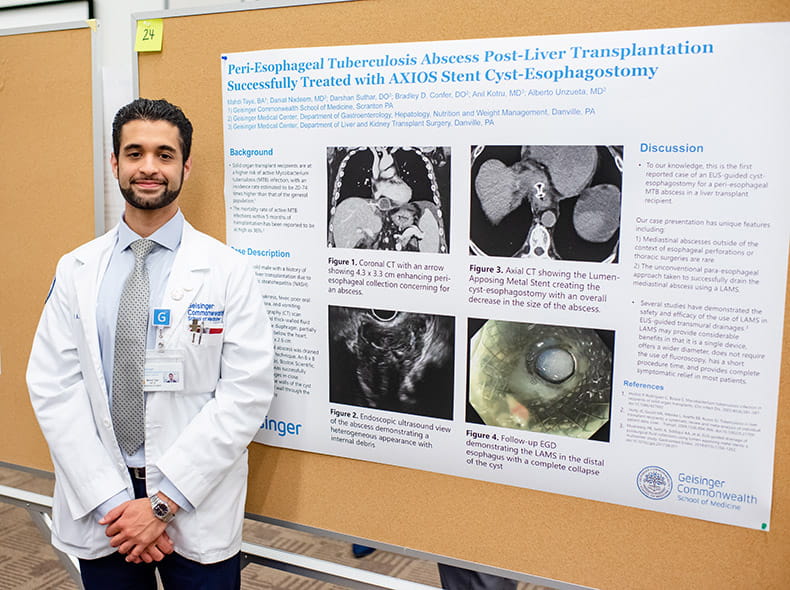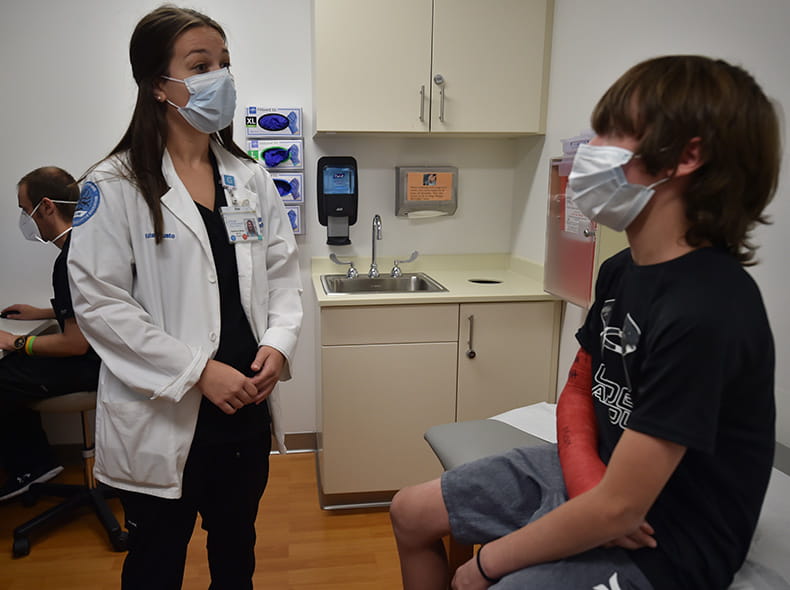Objectives and competencies
Geisinger Commonwealth’s 33 MD program objectives for the curriculum ensure that learners master the six Accreditation Council for Graduate Medical Education (AGCME) competencies that define what it means to be a patient-centered physician in today’s data-driven, systems-based environment.
Our program objectives are divided into six categories:
Patients, families and communities
Geisinger Commonwealth physicians focus on the patient. Our duty is to the patient and to the profession. We dedicate ourselves to excellence for the benefit of the community.
- Demonstrate insight and understanding of patient’s and family’s emotions and the human response. Build trust with patients and their families.
- Communicate effectively with patients, families and the public across diverse backgrounds.
- Counsel, advocate for and educate patients and their families to empower them to participate in their care and enable shared decision-making.
- Employ effective knowledge of the social determinants of health and populations of patients when advocating for optimal solutions for health issues facing patients and communities.
- Practice sensitivity, honesty and compassion in difficult conversations, including those about death, end of life, adverse events, bad news, disclosure of errors and other sensitive topics.

Professional identity
Geisinger Commonwealth physicians dedicate themselves to professionalism and the lifelong maintenance of their knowledge, skill and expertise. They appreciate their important role in their community and effectively tend to their own well-being, while living a life of service to others.
- Adhere to the tenets of professionalism which include altruism, accountability, duty, excellence, honesty, integrity, respect for others and responsibility.
- Engage in lifelong personal and professional development and socialization into the medical community of practice.
- Set learning and improvement goals and incorporate feedback into daily practice to ensure a lifelong commitment to the understanding of current medical knowledge and practices.
- Identify strengths, deficiencies and limits in one’s knowledge and expertise and perform learning activities that address one’s gaps in knowledge, skills and/or attitudes.
- Participate in the education of patients, families, students, trainees, peers, members of the community and other health professionals and incorporate feedback into daily practice.
- Use the knowledge of one’s own role and the roles of other health professionals to facilitate the maintenance of an effective healthcare team.
Health system science
Geisinger Commonwealth physicians work effectively within a highly integrated system and know how to lead teams, leveraging each member’s unique skill set and competently deploying technology to benefit patients and communities.
- Discuss the core financial, legal, structural, policy and regulatory aspects of the United States healthcare system and their impact on the delivery of healthcare.
- Examine how quality improvement, patient safety and innovation can improve the various healthcare delivery models.
- Demonstrate a commitment to ethical principles pertaining to provision or withholding of care, confidentiality, informed consent and business practices, including compliance with relevant laws, policies and regulations.
- Engage in identifying medical errors and implementing potential systems solutions.
- Effectively communicate and work with other health professionals to establish, develop and continuously enhance interprofessional teams to provide patient- and population-centered care that is safe, timely, efficient, effective and equitable.
- Systematically analyze practice using quality improvement methods, and implement changes with the goal of practice improvement.
- Incorporate considerations of cost awareness, risk-benefit analysis and community needs in patient and/or population-based care.
Critical thinking
Geisinger Commonwealth physicians master the key intellectual abilities required to be an effective provider. They intelligently assess and synthesize information from disparate sources to arrive at timely, accurate diagnoses and treatments.
- Formulate clinical questions, appraise and apply evidence-based medicine to provide quality healthcare to individuals and populations.
- Make informed decisions about diagnostic and therapeutic interventions based on patient information and preferences, up-to-date scientific evidence and clinical judgment.
- Contribute to the creation, dissemination, application and translation of new healthcare knowledge and practices.
Clinical skills
Geisinger Commonwealth physicians master all aspects of clinical care including communication, physical exam, the use of technology, medical procedures, management of care and coordination with the healthcare team.
- Conduct and document complete and focused medical histories and physical examinations, and recognize factors including age, gender, sociocultural factors, socioeconomic status, family history and emotional state.
- Gather and interpret pertinent and accurate information about patients and their conditions through the use of laboratory data, imaging and other tests.
- Identify and propose a treatment and management plan for acute and chronic diseases.
- Perform appropriate medical, diagnostic and surgical procedures essential for the patient care.
- Organize and prioritize responsibilities to provide care that is safe, effective and efficient.
- Provide appropriate referral of patients including ensuring continuity of care throughout transitions between providers or settings and following up on patient progress and outcomes.
- Provide healthcare services to patients, families and communities aimed at preventing health problems or maintaining health.
- Perform appropriate supervisory responsibilities commensurate with one’s roles, abilities and qualifications on a healthcare team.

Knowledge for practice
Geisinger Commonwealth physicians understand the foundational role of medical and clinical knowledge in the maintenance of health and the diagnosis and treatment of disease. They use scientific approaches to the care of patients and populations.
- Apply established and emerging foundational scientific principles fundamental to healthcare for patients and populations.
- Apply established and emerging principles of clinical sciences to diagnostic and therapeutic decision-making, clinical problem-solving and other aspects of evidence-based healthcare.
- Apply principles of social-behavioral sciences to provision of patient care, including assessment of the impact of psychosocial and cultural influences on health, disease, care seeking, care compliance and barriers to and attitudes toward care.
- Apply principles of populational health sciences to the identification of health problems, risk factors, treatment strategies, resources and disease prevention/health promotion efforts for patients and populations.
